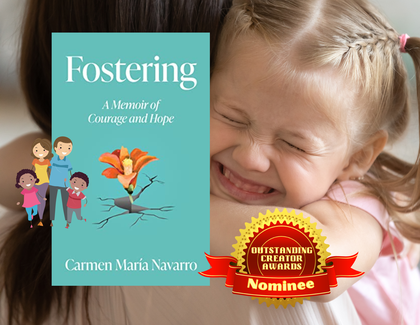|
Score: 94/100 (9.4 out of 10)
Fostering: A Memoir of Courage and Hope by Carmen Maria Navarro is a heartfelt, genuine, eye-opening book about the ups and downs of the child welfare/foster care system. Navarro is an incredible human being as well as an author who has walked the talk and experienced this system first-hand. The book centers on the Navarro family's experiences with several foster care children, all of them unique and special in their own ways. Each with their own strengths, weaknesses, and challenges. What's incredible about this book is that no matter how difficult some of these children may be to care for, the author's love for them is unconditional. There is so much love in this book! What's also incredible is the amount of tension in this book. For example, we're all cheering for a happy ending. That's a plus in favor of the book right there—we truly CARE about the people involved. The sad fact is that happy endings aren't guaranteed or truly permanent/everlasting. Sometimes in life, you reach a pinnacle only to experience a major setback or fall. Sometimes the hardest thing to do is to let go of the people and things that we've nurtured and built. You really feel the weight of the decisions that the Navarro family makes. It's painful and heart-wrenching. There are a number of compelling real-life figures in this book, many of whom use made up names to protect their privacy. There's Andy, the first child whose biological mom was going through a crisis. There's Danny, a boy who insists on the family watching and reciting lines from the Disney movie Wreck It Ralph each and every night. He's totally in the right as Wreck It Ralph is the best Disney animated movie of the recent era. What's extra incredible about Danny is that we actually learn about encounters with him later in life when he was more mature. He even remembers his time in the Navarro household. There's an African American girl named Naomi who expresses a sort of culture shock (living with a Latino-White family) while also struggling with an eating disorder. It is also revealed that she may have a criminal history, something which the state kept a secret from the family. There's also another foster child (or two) who we're introduced to in the epilogue, ending this book on an almost perfect note that brings everything full-circle. We won't spoil that. However, out of all these foster children, the most interesting by far is Lucy. Lucy even has her own section dedicated exclusively to her. So, who is Lucy and what is her deal? Well, first of all: POTENTIALLY TRIGGERING CONTENT AHEAD. Lucy is a troubled yet very likable child who alternates between times of frustration and even violence to times of demonstrating incredible affection and creativity. She is an onion—a frozen onion frozen there by circumstances beyond her control. She was a victim of grooming and sexual abuse by her own father, something which greatly affected her trust and future interactions with people. Despite sometimes lashing out and being anti-social, Lucy's cold outer shell slowly melts as she becomes comfortable with loving, physical contact again. In fact, she becomes so affectionate and loving that Navarro is forced to teach her about boundaries—both for her and for other people. Navarro is preparing her to protect herself from future sexual abuse. Something else that's very endearing about Lucy is that she loves to try things and express herself in different ways. She is a terrific singer with the voice of an angel. She also loves to apply makeup to herself and others, although not necessarily doing that great of a job some of the time. She also loves cheetahs. In fact, cheetah prints make up a great deal of her favorite clothes. Lucy just seems like a very dynamic character, someone who is flawed in a lot of ways yet full of hope. She inspires hope in us that someday she could have the happy life she deserves, righting the wrongs of her past life. While showcasing the experiences with these foster children, Navarro does a terrific job at pointing out the flaws of the child welfare/foster care system and aspects of it that go unacknowledged. Perhaps the biggest thing she points out is that the system knowingly and willingly keeps prospective foster parents in the dark about their prospective foster kids as a sort of privacy or confidentiality issue. The problem is that some of these foster children have histories that seem pertinent for the foster family to know about beforehand. For example, it seems wrong that the family wasn't told that Naomi had gone to juvenile prison for an undisclosed and potentially violent crime, all the while living under the same roof and right next door to other minors. They also weren't informed about her eating disorder or about Lucy's sexual abuse, something which possibly led to Lucy acting out physically and violently toward her foster siblings including choking one of them. These are significant pieces of undisclosed information that aren't just helpful, they are necessary to know both for the wellness of the foster children and the safety of the foster family. Foster families who are essentially doing the state a favor by taking in these children shouldn't be left in the dark by the state. Another issue that keeps coming up is the consideration of how having foster children influences and affects the biological children in the household. What influence are they getting? Are they feeling neglected or abandoned? Threatened? Afraid? What lessons are they acquiring from being a part of such a household? Check out this heartwarming, heart-wrenching, and eye opening book on Amazon!
0 Comments
Leave a Reply. |
Archives
July 2024
Categories |

 RSS Feed
RSS Feed